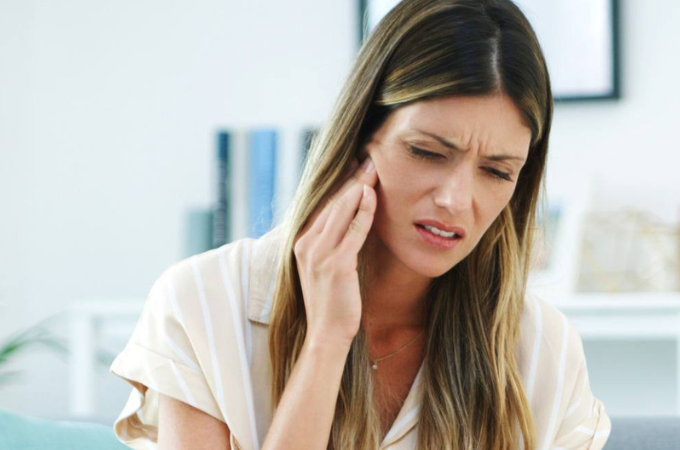Teeth grinding, also known as bruxism, is a condition that causes individuals to clench, grind, or gnash their teeth as a result of stress, anxiety, and other factors. Many people unintentionally grind their teeth from time to time, which typically does not cause harm. However, when teeth are ground regularly, tooth damage and other oral health complications can arise.1
Chronic teeth grinding has the potential to result in the fracture, loosening, or loss of teeth. It can also wear teeth down and cause both oral and bodily pain. If you are experiencing discomfort as a result of this condition, see your dentist who will determine the best course of treatment.1 Depending on the severity of any damage caused by bruxing, treatment can range from a night guard to tooth replacement.
Signs and Symptoms of Teeth Grinding
Since teeth grinding often occurs during sleep, many people are unaware that they grind their teeth.1 So, it is important to know the signs and symptoms to watch out for. If you notice any of the following, we suggest you raise them with your dentist, as you may be at risk:
- Headaches2
- Teeth that are flattened, fractured, chipped, or loose3
- Worn tooth enamel that exposes deep layers of your tooth3
- Tooth pain or sensitivity3
- Jaw, neck, or face pain or soreness3
- Sleep disruption3
- Grinding sounds while asleep1
- Temperature-sensitivity in teeth4
- Tooth indentations on the tongue4
- Aching and/or stiffness of the face and temples just after waking up5
Common Causes of Teeth Grinding
There are a number of reasons why you might start grinding your teeth.
- Oral Problems: Tooth issues such as an abnormal bite, missing, or crooked teeth can cause individuals to grind their teeth. There may also be an issue with your temporomandibular joint (TMJ) or the muscles around the jaw. If these muscles spasm during sleep, it can trigger teeth grinding. Children are also more likely to grind their teeth when their teeth are misaligned or growing in.1
- Anxiety & Stress: Worrying excessively can cause you to clench your jaw and work it back and forth. Problems in the workplace, relationship issues, financial troubles, and other bothersome situations can result in emotional distress that can, in turn, cause some individuals to grind their teeth.5
- Other Medical Conditions: Certain disorders like Parkinson’s disease, Huntington’s disease, and sleep disorders such as sleep apnea can cause teeth grinding. The condition can also arise as a side effect of certain medications, such as antidepressants.3
Risk Factors & Complications
There are certain risk factors that can increase your chances of teeth grinding. It is important to note that these factors do not necessarily mean you will develop bruxism. However, if you suspect you are suffering from the condition, the following factors3 should be considered:
- Stress: Anxiety and stress can lead to teeth grinding, along with anger and frustration.
- Age: Grinding is common in young children and in many cases subsides prior to adulthood.
- Personality Type: Those who have aggressive or hyperactive personalities can be at a higher risk for teeth grinding.
- Medications & Other Substances: Teeth grinding is an uncommon side effect of some psychiatric medications, such as antidepressants. Drinking caffeinated beverages or alcohol may also increase your risk of teeth grinding, especially if consumed in excess.
- Family Members with Bruxism: Teeth grinding tends to run in families. If you have a family member who grinds their teeth, you may be at higher risk.
- Other Disorders: Teeth grinding can be associated with some mental health and medical disorders, as well as certain sleep-related disorders.
When to see a Dentist/Doctor
If you have any of the signs or symptoms mentioned above, schedule an appointment with your dentist. It is important to keep up with regular appointments so that your dentist can monitor for signs of dental damage.
Treatment
Your dentist will help identify the best solution for your unique situation. In severe cases where tooth damage or jaw pain is present, your dentist may recommend treatment options that include, but are not limited to:
Dental Approaches
If your teeth grinding is causing tooth damage, your dentist may suggest ways to improve or preserve your teeth. It should be noted that while these options may help to protect the teeth, they may not stop the grinding itself.
- Splints & Mouthguards: Constructed of hard acrylic or soft materials, these devices are designed to keep teeth separated from each other in order to avoid the damage caused by grinding and clenching.3
- Dental Correction: In cases where tooth wear has led to sensitivity or the inability to chew comfortably, your dentist may opt to reshape the chewing surfaces of your teeth or use crowns to repair the damage grinding has caused.3
Therapy
If stress is causing you to grind your teeth, ask your doctor or dentist about options that can help reduce your stress levels. There are many options to explore such as joining an exercise program, but it’s best to first start by contacting your dentist.
Addressing Associated Disorders and Complications
Teeth grinding can be the result of an associated disorder or complication. These can include, but are not limited to:
- Sleep-Related Disorders: Addressing sleep-related disorders such as sleep apnea can alleviate teeth grinding.1
- Medical Conditions: If you have another underlying medical condition, it is important to continue monitoring and treating such condition, as it can be a contributing factor to your teeth grinding.3
- Medications: It is possible to experience teeth grinding as a drug-related side effect. If this is the case with one of your medications, your doctor may adjust your dosage or prescribe a different medication.3
If you are looking to alleviate your teeth grinding symptoms, reach out to your dentist to determine the best course of treatment.
Final Thoughts
Teeth grinding can be caused by a number of factors including age, stress, anxiety, and other issues. However, it can be alleviated or cured through a number of approaches. Overcoming it requires an evaluation with your to infer the cause of your grinding and discuss safe treatment options.
If you have additional questions or require further support, check out our oral health resources.
1. Staff, WebMD. “Teeth Grinding (Bruxism): Causes and Treatments.” WebMD, WebMD, 2019
2. Staff, Colgate. “How to Stop Grinding My Teeth | Colgate Oral Care.” Colgate, Colgate Oral Care, 2019
3. Staff, Mayo Clinic. “Bruxism (Teeth Grinding).” Mayo Clinic, Mayo Foundation for Medical Education and Research, 10 Aug. 2017, https://www.mayoclinic.org/diseases-conditions/bruxism/diagnosis-treatment/drc-20356100
4. About Bruxism.” Sleep.ai, 20 Feb. 2017, sleep.ai/information/grinding-bruxism/
5. Department of Health & Human Services. “Teeth Grinding.” Better Health Channel, Department of Health & Human Services, 30 Apr. 2015, www.betterhealth.vic.gov.au/health/conditionsandtreatments/teeth-grinding




